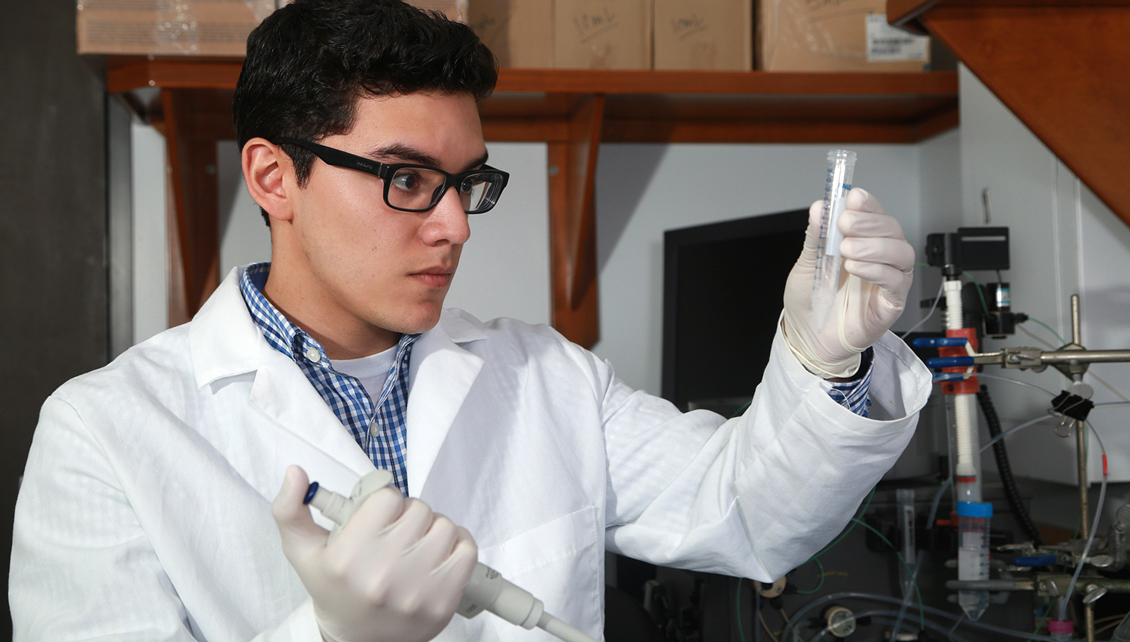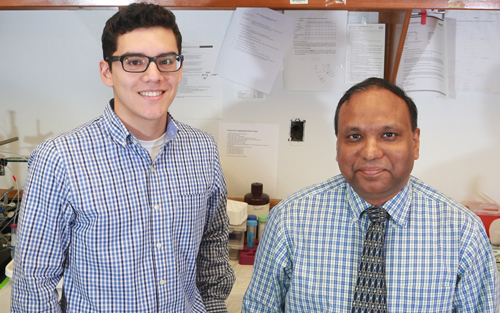Research News

New Target for Alzheimer's Disease?
Undergraduate in UHCOP Lab Wins ABRCMS Awards for Preliminary Work on Mechanisms of Clinical Trial Drug
A University of Houston Honors College undergraduate student working with a UH College of Pharmacy faculty researcher was recognized at a national conference for their work to understand the mechanisms of a novel drug currently in U.S. clinical trials for the treatment of Alzheimer's Disease.
Biochemical and Biophysical Sciences student Francisco Blanco received a Travel Award and a Student Poster Presentation Award at the Annual Biomedical Research Conference for Minority Students (ABRCMS) Nov. 9-12 in Tampa, Fla. The conference is managed by the American Society of Microbiology and supported by a grant from the National Institutes of Health.
Blanco's presentation, entitled "Mammalian Unc13-1 and Unc13-2 Isoforms as Potential Novel Bryostatin-1 Targets," was based on his research over nearly two years in collaboration with UHCOP Associate Professor Joydip Das, Ph.D.
Derived from a species of marine invertebrate animals that feed by filtering nutrients from the surrounding ocean environment, Bryostatin-1 has been the subject of dozens of the clinical trials as an anticancer drug and more recently as a treatment for Alzheimer's disease.

The project is a bit of departure for Das, who has been investigating the presynaptic protein Munc13-1 as a potential drug target for alcoholism as part of a five-year, $1.79 million National Institutes of Health grant he received in 2015. Das said he was intrigued by research that has indicated the activating pathway for the Alzheimer's clinical trial drug Bryostatin-1 is through protein kinase C (pKC), which shares a common activator-binding domain (C1) with the subject of his own research: Munc13-1.
In their 2006 paper titled "Bryostatin-1: Pharmacology and Therapeutic Potential as a CNS Drug" published in CNS Drug Reviews, authors Miao-Kun Sun and Daniel L. Alkon postulated that "The underlying pharmacological mechanisms may involve an activation of PKC isozymes, induction of synthesis of proteins required for long-term memory, restoration of stress-evoked inhibition of PKC activity, and reduction of neuro-toxic amyloid accumulation and tau protein hyperphosphorylation.
"Munc13-1 is a vesicle-binding protein in the presynaptic zone, which primes neurotransmitter release, and although protein kinase C is present in the central nervous system, it's not involved in the same processes as Munc13-1," Das said. "We hypothesized that perhaps Bryostatin binds to protein kinase C in the same domain as Munc13-1, and therefore affects neurotransmitter release.
"Although we cannot say with certainty at this stage, but perhaps neurotransmitter release through Munc13-1 activation at least partly contributes to the positive results on cognitive function that have been indicated in some of the early studies on Bryostatin-1 for Alzheimer's disease."
For Munc13-1 to perform its role in vesicular priming, it has to interact along the cell membrane with the other proteins involved, Blanco said.
"In this project, we were able to apply a translocation assay using culture cells from a mouse model that, based on the localization of the green florescence protein tag, we were able to determine that the protein was being activated," Blanco said. "The fluorescence tag went from being distributed throughout the cell to being concentrated in the periphery of the cell."
A high-achieving student, Blanco has made the Dean's List for five consecutive semesters and is a member of the Phi Kappa Phi Honor Society. His work with Das is part of his Honors College project, but Blanco said the experience helped reinforce his goal of attending graduate school after completing his undergraduate degree in May 2017.